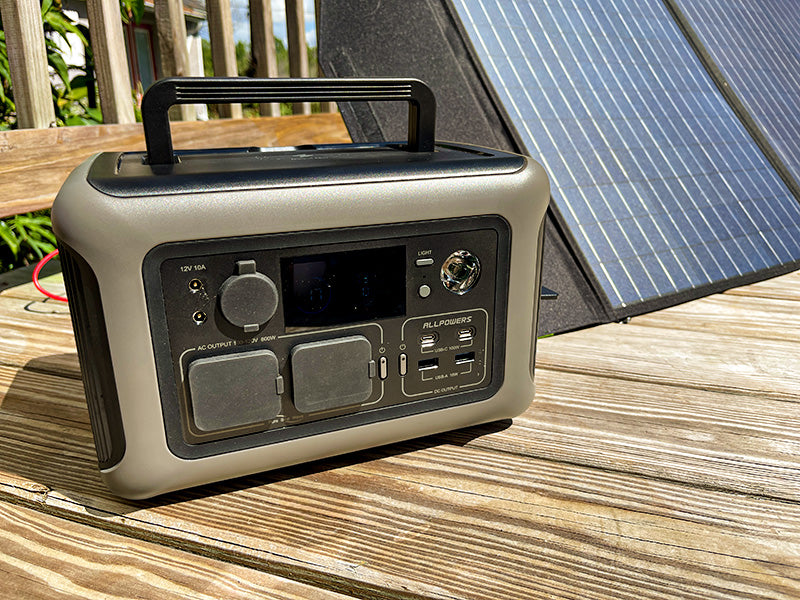In today's world, using solar energy to generate electricity is becoming increasingly popular and practical. Whether you're considering solar energy as a backup during power outages, for off-grid living, or to reduce your carbon footprint, choosing the right combination of power plant capacity and solar panel output is critical to a reliable and efficient setup.
Understanding the power capacity of the power plant:
Power stations, also known as portable power stations or solar generators, come in a variety of capacities, typically measured in watt-hours (Wh) or kilowatt-hours (kWh). This capacity represents the amount of energy the station can store and provide.
Factors influencing the selection of power plant capacity:
Energy requirements: Determine your daily energy requirements. Consider the appliances and household devices you plan to run. A small camping system will require much less capacity than a home backup system.
Duration: How long do you need power? If you want backup power during extended power outages, you'll need a higher capacity. For short-term needs, a smaller unit may be sufficient.
Charging frequency: If you rely on solar panels for charging, you must consider the time it takes to fully charge the unit. A larger capacity may require more solar panels or longer charging times.
ALLPOWERS offers a range of power plants to choose from
| Model | capacity | AC output |
| S200 | 154Wh | 200W |
| S300 | 288Wh | 300W |
| S700 | 606Wh | 700W |
| S1500 | 1092Wh | 1500W |
| S2000 | 1500Wh | 2000W |
| S2000PRO | 1500Wh | 2400W |
We also have R-series LiFePO4 power stations:
| Model | capacity | AC output |
| R600 | 299Wh | 600W |
| R1500 | 1152Wh | 1800W |
| R2500 | 2016Wh | 2500W |
| R3500 | 3168Wh | 3500W |
| R4000 | 3600Wh | 4000W |
How to choose the right solar panel power:
Solar panels are rated by their power in watts (W) or kilowatts (kW). The choice of solar panel power is closely related to the capacity of your power plant.
Important considerations for selecting solar panel performance:
Capacity tuning: Make sure your solar panels can generate enough energy to fully charge your power station. Calculate the daily energy production of your panels based on local sunlight conditions.
Efficiency: High efficiency panels produce more power per unit area. Consider the space available for installation when selecting panel size.
Compatibility: Check that the voltage and plug of the solar panels match those of your power station. Some power stations may require specific types of panels.
ALLPOWERS offers a range of solar modules to choose from
| Model | PeakPower | Solar cell |
| SP012 | 100W | Monocrystalline |
| SP020 | 60W | Monocrystalline |
| SP026 | 60W | Polysilicon |
| SP033 | 200W | Polysilicon |
| SP035 | 200W | Monocrystalline |
| SP037 | 400W | Polysilicon |
| SP039 | 600W | Monocrystalline |
| SF100 | 100W Flexible | Monocrystalline |
| SF200 | 200W Flexible | Monocrystalline |
Sizing your solar panel array:
To properly size your solar panel array, follow these steps:
Determine your daily energy needs: Calculate the total watt-hours (Wh) or kilowatt-hours (kWh) of electricity your appliances and devices use daily.
Evaluate sunlight conditions: Research the average hours of sunshine per day in your location. This information will help you estimate how much power your solar panels can produce daily.
Consider backup days: To compensate for cloudy days or reduced solar radiation in winter, it is advisable to add a buffer to your panel capacity. A buffer of 10-20% is recommended.
Or find out here how long power plants with different capacities are expected to be able to supply your systems with electricity.
Diploma:
Choosing the right combination of power plant capacity and solar panel power is critical to a successful solar energy installation. By knowing your energy needs, evaluating solar irradiance, and properly sizing your solar panel array, you can ensure a reliable and efficient solar power system that meets your needs, whether for backup power or sustainable off-grid living.
